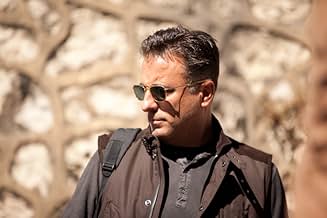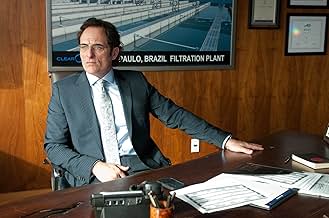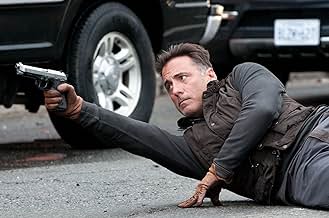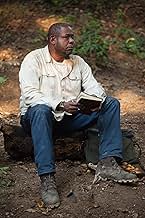Un ancien agent de la CIA devenu animateur de talk-show politique est embauché par un actionnaire mécontent de l'entreprise pour dénoncer la dissimulation par son entreprise d'un incident et... Tout lireUn ancien agent de la CIA devenu animateur de talk-show politique est embauché par un actionnaire mécontent de l'entreprise pour dénoncer la dissimulation par son entreprise d'un incident et de décès dans un village équatorien.Un ancien agent de la CIA devenu animateur de talk-show politique est embauché par un actionnaire mécontent de l'entreprise pour dénoncer la dissimulation par son entreprise d'un incident et de décès dans un village équatorien.
- Prix
- 1 victoire au total
- General Aguila
- (as Alfredo Alvarez)
- Assaulting Soldier
- (as Elias Caamano)
Histoire
Le saviez-vous
- AnecdotesEnd of film: This motion picture is a dramatic interpretation of true events based upon hundreds of media accounts of these events, as well as interviews with many of those involved. Much of the dialogue is based upon publicly recorded conversations and the congressional record. None of the people portrayed in this film were compensated. Some of the actual names have been changed, certain events and characters have been fictionalized and some time lines have been condensed for dramatic purpose.
- GaffesThe flag emblem on the soldiers uniform is not that of Ecuador, is from Bolivia.
- Citations
Jack Begosian: It started about 300 years ago in England with the turning of public lands into private property. And it changed the way we think, the way we view time, and land, and water - and even people. It turned them into units. Commodities to be bought and sold, and therefore exploited.
Radio Caller Woman: Yeah, but what is bought and sold is constant. That's never going to change.
Jack Begosian: You know what Sarah, that is absolutely incorrect. Society need to approve of the things to be turned into commodities before they can be bought or sold. People can be bought or sold, correct? That did happen. As horrific and diabolical as that may sound, it's a fact.
Radio Caller Woman: Yeah, and still slavery happens in some countries today.
Jack Begosian: Regrettably true. But why is it that in western society we no longer buy and sell people.
Radio Caller Woman: Because it's immoral and it's wrong in all aspects.
Jack Begosian: Oh, well is it wrong to sell water? What about air, would it be wrong to sell air?
Radio Caller Woman: Air, I mean come on, I mean you can't sell air.
Jack Begosian: No?
Radio Caller Woman: Well, what if you can't afford it, hmm?
Jack Begosian: There's lots of people all around the world that can't afford much water. And what happens?
Radio Caller Woman: I don't know.
Jack Begosian: They die. Is it so far-fetched, Sarah, you can sell water but you can't sell air?
- ConnexionsFeatured in Behind the Truth (2013)
An ambitious movie, intending more than it achieves. At stake is a critique of the corporate cornering of water rights in the Third World. This is a real problem, and deserves better than this by Hollywood, if a big movie is the way to go about it. (A far better attempt, and a far better movie, is "También la lluvia", or "Even the Rain," set in Bolivia and starring Gael García Bernal.)
The really great actor here is Forest Whitaker, who has a fairly small role as a South American rebel leader with a true conscience. The lead actor is the ever-struggling (if sincere) Andy Garcia, who is a retired South American CIA man with a quasi-political radio talk show to keep him and his troubled wife and child alive and very well.
You can smell the connection that has to be made here, between Whitaker's jungle world of righteous rebellion and Garcia's safely withdrawn world of buried political misdeeds. The third world (narratively) is the big water purification company itself, with a slightly evil corporate head and his slow-to-wake sister who finally realizes the corporation their father started is corrupt and murderous. This third leg of the triangle is complex, and a bit unconvincing with its too-easy array of killers and corporate spies and Ecuadorian accomplices all a cell phone call away.
I might make clear here the movie is not a dud but it's very troubled, both formally (editing and writing issues, mostly) and in terms of its purported content. That is, ultra-violent scenes of mass murder are used over and over again to press home how ruthless and bloody the corporate heads are, safe in their glassed offices in Toronto. (Yes, the corporation is Canadian, which I guess is a nice novelty since Canadians are so famously nice.) The actual problem of water use and clean water supplies for the villages shown is never explored. Instead we have people running and getting gunned down with weirdly nonsensical abandon. A lot.
The more you dwell on this the more you realize the movie makers are as evil as the corporate bosses they are portraying. They use this horrifying cinematic mayhem to draw you in and make you (in theory) sympathize with the rebels, and with the ordinary people who just want to live and have clean water. Well, of course! So then we get back to Garcia drawn to the jungle to single-handedly (with a revolver) save these rebels from the advancing army troops. (Yes, Andy Garcia plays the Matt Damon character here, which is really quite funny at times, and not on purpose.)
So eventually you see through all the seriousness to a pretty poorly cobbled together movie with lots of overlapping plots and some very very fast solutions to messy problems (like getting the wanted rebel leader out of Ecuador on an airplane without a blink). I'd skip this mess for lots of reasons. And go see "Even the Rain" with its much gentler flaws.
- secondtake
- 19 sept. 2013
- Lien permanent
Meilleurs choix
- How long is A Dark Truth?Propulsé par Alexa
Détails
Box-office
- Brut – États-Unis et Canada
- 5 750 $ US
- Fin de semaine d'ouverture – États-Unis et Canada
- 630 $ US
- 6 janv. 2013
- Brut – à l'échelle mondiale
- 5 750 $ US
- Durée1 heure 46 minutes
- Couleur
- Rapport de forme
- 2.35 : 1
Contribuer à cette page



























